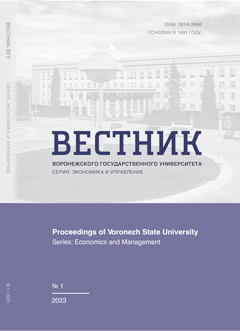Матрица выбора метода оценки стоимости портфельной компании на венчурных стадиях развития
Аннотация
Предмет. Оценка стоимости компаний-реципиентов венчурных инвестиций является неотъемлемой частью процесса получения финансирования. Корректное определение стоимости портфельной компании позволяет рассчитать долю в собственном капитале компании, которая будет получена венчурным фондом в обмен на инвестиции. В данной статье будут исследованы наиболее релевантные методы оценки стоимости компаний-реципиентов на венчурных стадиях развития.
Цель статьи заключается в разработке матрицы выбора метода оценки стоимости портфельной компании на венчурных стадиях развития с учетом национальной специфики.
Метод. Для достижения поставленной цели применялась следующая совокупность научных методов и приемов: классификация, индукция и дедукция, критический и логический анализ, обобщение, структуризация.
Результаты. Систематизированы и описаны операционные результаты, которые достигают компании-реципиенты венчурных инвестиций на инвестиционных стадиях развития, обобщены финансовые детерминанты. На основании обобщения финансовых и операционных результатов компаний-реципиентов венчурных инвестиций определены финансовые детерминанты, на которых основываются методы оценки стоимости портфельной компании. Было установлено, что нет идеального метода оценки недавно созданных инновационных компаний, разрабатывающих уникальную продукцию или услуги, для которых не сформирован рынок. В результате проведенного исследования разработана матрица выбора метода оценки стоимости портфельной компании. В отличии от существующих способов предложенная матрица представляет системный подход, который позволяет выбрать методы оценки в зависимости от инвестиционной стадии развития, на которой находится компания-реципиент инвестиций.
Литература
Achimská, V. (2020) Start-ups, bearers of innovation in globalizing environment and their valuation. SHS Web of Conferences. 74, 01001. DOI: 10.1051/shsconf/20207401001
Achleitner, A. K. & Lutz, E. (2005) First Chicago Method: Alternative Approach to Valuing Innovative Start-Ups in the Context of Venture Capital Financing Rounds. [First-Chicago-Methode-Alternativer Ansatz zur Bewertung von innovativen Unternehmensgründungen bei Venture-Capital-Finanzierungen]. Betriebswirtschaftliche Forschung und Praxis. 57(4), 333-347. (In German)
Akkaya, M. (2020) Startup Valuation: Theories, Models, and Future. Valuation Challenges and Solutions in Contemporary Businesses. IGI Global. 137-156. DOI: 10.4018/978-1-7998-1086-5.ch008
Alvarez, S. A. & Barney J. B. (2007) Discovery and creation: Alternative theories of entrepreneurial action. Strategic Entrepreneurship Journal. 1, 11–26. DOI: 10.1002/sej.4
Babiarz, A. (2016) Methods of valuing investment projects used by Venture Capital funds, financed from public funds. [Metody wyceny projektów inwestycyjnych stosowane przez fundusze venture capital finansowane ze środków publicznych]. Research papers of wrocław university of economics. 428, 11-28. DOI: 10.15611/pn.2016.428.01 (In Czech)
Barg J., Drobetz W. & Momtaz P. (2021) Valuing start-up firms: A reverse-engineering approach for fair-value multiples from venture capital transactions. Finance Research Letters. Working Paper. DOI: 10.1016/j.frl.2021.102008
Bernardo, A., Momtaz P. & Welch I. (2021) The discount for lack of marketability in private investments in public equity. UCLA Anderson Working Paper.
Bhagat, S. (2014) Why do venture capitalists use such high discount rates? Journal of Risk Finance. 15(1), 94-98. DOI: 10.1108/JRF-08-2013-0055
Bhide, A. (1992) Bootstrap finance: The art of start-ups. Harvard Business Review. 70 (6), 109–117.
Burton, M. D., Sorensen, J. B. & Beckman, C. M. (2002) Coming from good stock: Career histories and new venture formation. In M. Lounsbury, & M. J. Ventresca (Eds.), Research in the sociology of organizations. 19, 229‐262. Greenwich, CT, JAI Press.
Choi, D. S., Sung, C. S. & Park, J. Y. (2020) How Does Technology Startups Increase Innovative Performance? The Study of Technology Startups on Innovation Focusing on Employment Change in Korea. Sustainability. 12(2), 551. DOI: 10.3390/su12020551
Coad, A., Frankish, J., Roberts, R.G. & Storey, D.J. (2013) Growth Paths and Survival Chances: An Application of Gambler’s Ruin Theory. Journal of Business Venturing. 28(5), 615-632. DOI: 10.1016/j.jbusvent.2012.06.002
Damodaran, A. (2009) Valuing Young, Start-Up and Growth Companies: Estimation Issues and Valuation Challenges. SSRN Electronic Journal. 67. DOI: 10.2139/ssrn.1418687
De Oliveira, F. B., & Zotes, L. P. (2018) Valuation methodologies for business startups: A bibliographical study and survey. Brazilian Journal of Operations & Production Management. 15(1), 96–111. DOI: 10.14488/BJOPM.2018.v15.n1.a9
Dehghan-Eshratabad, M. & Albadvi, A. (2018). Applying real option approach for startup valuation by venture capitalists in first round of financing. Management Research in Iran. 22(3), 21-27.
Dickinson, V. (2011) Cash Flow Patterns as a Proxy for Firm Life Cycle. The Accounting Review, Forthcoming. 86(6), 1969–1994. DOI: 10.2139/ssrn.1268509
Dusatkova, M. S., & Zinecker, M. (2016) Valuing start-ups – selected approaches and their modification based on external factors. Business: Theory and Practice. 17(4), 335-344. DOI: 10.3846/btp.17.11129
Ewens, M., & Farre-Mensa J. (2020) The deregulation of the private equity markets and the decline in IPOs. Review of Financial Studies. 33(12), 5463-5509. DOI: 10.1093/rfs/hhaa053
Fernández, P. (2007) Company valuation methods. The most common errors in valuations. IESE Business School, IESE Research Papers. DOI: 10.2139/ssrn.1025424
Festela, G., Wuermseherb, M., & Cattaneoc, M. (2013) Valuation of Early Stage High-tech Start-up Companies. International Journal of Business. 18(3), 216-231.
Florin, J., M. Lubatkin & Schulz W. (2003) A social capital model of high-growth ventures. Academy of Management Journal. 46(3), 374–384. DOI: 10.2307/30040630
Frei P. & Leleux, B. (2003) Valuating the Company. Starting a Business in the Life Sciences- from Idea to Market. In Luessen, H. (ed.) Germany, Aulendorf, Cantor Verlag, 42-55.
Garnsey, E., Stam, E. & Heffernan, P. (2006) New Firm Growth: Exploring Processes and Paths. Industry and Innovation. 13, 1-20. DOI: 10.1080/13662710500513367
Goldman, M. (2008) Valuation of startup and early-stage companies. A Profissional Development Journal for the Consulting Disciplines. 8-16.
Graham, B. (2003) The intelligent investor. New York, HarperCollins World.
Halt, G. B., Donch, J. C., Stiles, A. R. & Fesnak, R. (2017) Valuing Startup Companies. Intellectual Property and Financing Strategies for Technology Startups. 205-218. DOI: 10.1007/978-3-319-49217-9_16
Hoseini, S. A. & Moradi Esfanjani, H. (2019) Designing a Valuation Model for Petroleum Startups. International Journal of Finance & Managerial Accounting. 3(12), 95-107.
Knaup, A. & Piazza, M. (2007) Business Employment Dynamics Data: Survival and Longevity. Monthly Labor Review. 130(9), 3-10.
Koeplin, J., Sarin A. & Shapiro A. (2000) The Private Company Discount. Journal of Applied Corporate Finance. 12(4), 94-101.
Krishna, A., Agrawal, A. & Choudhary, A. (2016) Predicting the outcome of startups: less failure, more success. 2016 IEEE 16th International Conference on Data Mining Workshops, 12-15 Dec. 2016, Barcelona, Spain. IEEE. 798-805.
Laitinen E. K. (2019) Discounted Cash Flow (DCF) as a Measure of Startup Financial Success. Theoretical Economics Letters. 9(08), 2997-3020. DOI: 10.4236/tel.2019.98185
Laitinen, E. K. (2017) Profitability Ratios in the Early Stages of a Startup. The Journal of Entrepreneurial Finance. 19(2), 1-28.
Manigart, S., Wright, M., Robbie, K., Desbrières, P. & De Waele, K. (1997) Venture Capitalists’ Appraisal of Investment Projects: An Empirical European Study. Entrepreneurship: Theory and Practice. 21(4), 29-44.
Martins, A. (2011). The valuation of privately held firms and litigation: A case study. International Journal of Law and Management. 53(3), 207-220.
Momtaz, P.P. (2021) CEO emotions and firm valuation in initial coin offerings: An artificial emotional intelligence approach. Strategic Management Journal. 42(3), 558-578.
Montani D., Gervasio D., Pulcini A. (2020) Startup Company Valuation: The State of Art and Future Trends. International Business Research. 13(9). DOI: 10.5539/ibr.v13n9p31
Pepis, S., Evans, J. & de Jong, P. (2018) The Valuation of Startups in New Markets: an Applied Case in Asteroid Mining. International Journal of Business and Social Science. 9(4), 10-16. DOI: 10.30845/ijbss.v9n4p2
Petersen, C. & Plenborg, T. (2009) The implementation and application of firm valuation models. The Journal of Applied Business Research. 25(1), 1-12.
Plummer, J. (1987) QED report on venture capital financial analysis. Palo Alto, CA, QED Research, Inc.
Pratt, S.P. (2001) Business Valuation Discounts and Premiums. New York, John Wiley & Sons.
Rao, H., Greve, H. R. & Davis G. F. (2001) Fool’s gold: Social proof in the initiation and abandonment of coverage by Wall Street analysts. Administrative Science Quarterly. 46(3), 502–526. DOI: 10.2307/3094873
Reis, P. & Augusto, M. (2013) The terminal value (TV) performing in firm valuation: The gap of literature and research agenda. Journal of Modern Accounting and Auditing. 9(12), 1622-1636.
Reverte, C., Sánchez-Hernández, M. D. M. & Rojo-Ramírez, A. (2016) The profile of venture capital investments: the European context. International Journal of Business and Globalisation. 17(1), 83-110. DOI: 10.1504/IJBG.2016.077568
Robinson, R. B. (1987) Emerging strategies in the venture capital industry. Journal of Business Venturing. 2(1), 53–77.
Ross, S., Westerfeld, R. & Jaffe, J. (2007) Modern financial management. New York, McGraw-Hill.
Sahlman, W. A. & Scherlis, D. R. (2009) A Method For Valuing High-Risk, Long-Term Investments: The "Venture Capital Method". Harvard Business School. Background Note 288-006. 52.
Sammut, S. M. (2012) Valuation Methods in Early-Stage Biotechnology Enterprises: The" Venture Capital Method" at Work. Journal of Commercial Biotechnology. 18(2), 78–82. DOI: 10.5912/jcb494
Steffens, P. & Douglas, E. (2007) Valuing technology investments: use real options thinking but forget real options valuation. International Journal of Technoentrepreneurship. 1(1), 58-77. DOI: 10.1504/IJTE.2007.013270
Tourani-Rad, A., & Bryce, E. (2003) Characteristics of Venture Capital Firms and Investment Appraisals: Australian Evidence. Journal of Entrepreneurial Finance and Business Ventures. 8(2), 71-85.
Tyebjee, T. T. & Bruno A. V. (1984) A model of venture capitalist investment activity. Management Science. 30(9), 1051–1066.
Visconti, R. M. (2020) The Valuation of Technological Startups. In The Valuation of Digital Intangibles. Palgrave Macmillan, Cham. 155-192. DOI: 10.1007/978-3-030-36918-7
Waldron, D. & Hubbard, C. (1991) Valuation methods and estimates in relationship to investing versus consulting. Entrepreneurship: Theory and Practice. 16 (1), 43-52.
Wright, M. & Robbie, K. (1996) Venture Capitalists, Unquoted Equity Investment Appraisal and the Role of Accounting Information. Accounting and Business Research. 26(2), 153-168. DOI: 10.1080/00014788.1996.9729506
Zacharakis, A. L. & Meyer G. D. (1998) Do venture capitalists really understand their own decision process? A special judgement theory perspective. Journal of Business Venturing. 13(1), 57–76.
Zider, R. (1998) How venture capital works. Harvard Business Review. 76(6), 131–139.
Zott, C. & Huy Q. N. (2007) How entrepreneurs use symbolic management to acquire resources. Administrative Science Quarterly. 52(1), 70–105. DOI: 10.2189/asqu.52.1.70
Copyright (c) 2022 Макушина Е.Ю.

Это произведение доступно по лицензии Creative Commons «Attribution» («Атрибуция») 4.0 Всемирная.























